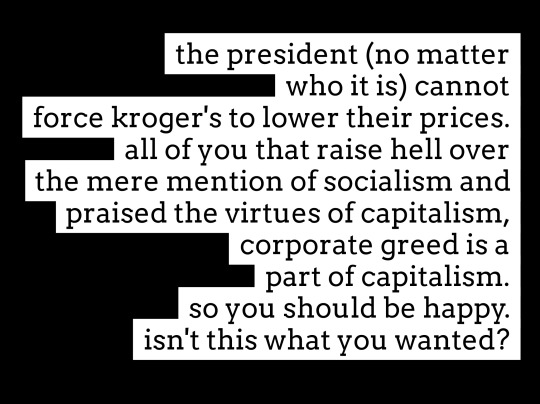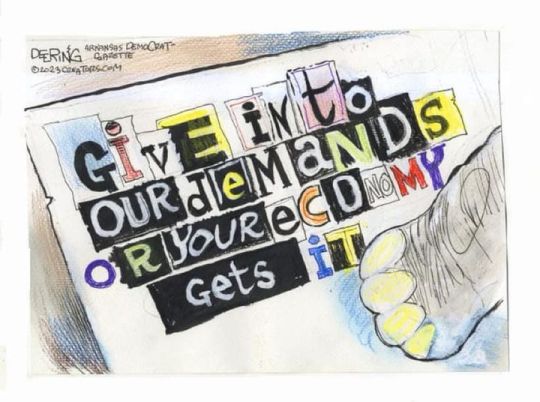#economic policy
Text
Text: When someone asks my political views
Picture of a book titled "Everybody has a house and everybody eats"

#leftism#leftist#hope for humanity#hopepunk#hope punk#hope#economic policy#government policy#ubiforward#ubiquiti#ubi#equity#futurism#solar punk#solarpunk#hopeposting#imagine#activism#antiwork
2K notes
·
View notes
Text


#political commentary#capitalism#corporate power#consumerism#economic policy#socialism#government intervention#market dynamics
134 notes
·
View notes
Note
on: "there is no ethical consumption under capitalism," would you agree to the corollary that: "and there CAN be no ethical consumption under capitalism" or is there some meliorist path towards ethical consumption under capitalism
As a social democrat, I'm very much a believer in "meliorist" solutions and deeply skeptical of the undistributed middle. It is a matter of historical fact that capitalism can function in a number of ethical "registers," and anyone who tells you otherwise is trying to sucker you into pseudo-revolutionary defeatism.
There is a real difference between completely unrestrained dark Satanic mills powered by child labor and slave cotton and a fully-realized social democratic mixed economy, complete with tripartite bargaining and co-determination, economic planning organized through a jobs state and decommodified/nationalized economic sectors including a social democratic welfare state, and a robust regulatory state that can enforce safety and environmental and labor standards at home and abroad - and there are many different points along that spectrum.

My main critique of the whole "ethical consumption under capitalism" thing is that the variant of it that stresses individual consumer behavior is a total fantasy.

It is simply impossible to exert pressure on capitalist systems on your own, or even through ad hoc or single-issue boycott efforts. You need social movements like the National Consumers League that combine mass mobilization with permanent infrastructure, those movements need to be in coalition with the labor movement and civil rights movements, all of them need a regulatory state with the capacity to enforce its will on corporations - and that state needs them as countervailing forces against corporate lobbyists.
youtube
#history#historical analysis#economic policy#political economy#regulation#regulatory state#ethical consumption under capitalism#economic history#social democracy#mixed economy#co-determination#boycotts
60 notes
·
View notes
Text
tell me something i don't know, captain obvious!
a new study from the London School of #Economics says 50 YEARS of #tax cuts have only helped one group — THE RICH💰💰
26 notes
·
View notes
Text

LETTERS FROM AN AMERICAN
February 1, 2024
HEATHER COX RICHARDSON
FEB 2, 2024
One of the biggest stories of 2023 is that the U.S. economy grew faster than any other economy in the Group of 7 nations, made up of democratic countries with the world’s largest advanced economies. By a lot. The International Monetary Fund yesterday reported that the U.S. gross domestic product—the way countries estimate their productivity—grew by 2.5%, significantly higher than the GDP of the next country on the list: Japan, at 1.9%.
IMF economists predict U.S. growth next year of 2.1%, again, higher than all the other G7 countries. The Federal Reserve Bank of Atlanta projects growth of 4.2% in the first quarter of 2024.
Every time I write about the booming economy, people accurately point out that these numbers don’t necessarily reflect the experiences of everyone. But they have enormous political implications.
President Joe Biden, Vice President Kamala Harris, Secretary of the Treasury Janet Yellen, and the Democrats embraced the idea that using the government to support ordinary Americans—those on the “demand” side of the economy—would nurture strong economic growth. Republicans have insisted since the 1980s that the way to expand the economy is the opposite: to invest in the “supply side,” investors who use their capital to build businesses.
In the first two years of the Biden-Harris administration, while the Democrats had control of the House and Senate, they passed a range of laws to boost American manufacturing, rebuild infrastructure, protect consumers, and so on. They did so almost entirely with Democratic votes, as Republicans insisted that such investments would destroy growth, in part through inflation.
Now that the laws are beginning to take effect, their results have proved that demand-side economic policies like those in place between 1933 and 1981, when President Ronald Reagan ushered in supply-side economics, work. Even inflation, which ran high, appears to have been driven by supply chain issues, as the administration said, and by “greedflation,” in which corporations raised prices far beyond cost increases, padding payouts for their shareholders.
The demonstration that the Democrats’ policies work has put Republicans in an awkward spot. Projects funded by the Infrastructure Investment and Jobs Act, also known as the Bipartisan Infrastructure Law, are so popular that Republicans are claiming credit for new projects or, as Representative Maria Elvira Salazar (R-FL) did on Sunday, claiming they don’t remember how they voted on the infrastructure measure and other popular bills like the CHIPS and Science Act (she voted no). When the infrastructure measure passed in 2021, just 13 House Republicans supported it.
Today, Medicare sent its initial offers to the drug companies that manufacture the first ten drugs for which the government will negotiate prices under the Inflation Reduction Act, another hugely popular measure that passed without Republican votes. The Republicans have called for repealing this act, but their stance against what they have insisted is “socialized medicine” is showing signs of softening. In Politico yesterday, Megan Messerly noted that in three Republican-dominated states—Alabama, Georgia, and Mississippi—House speakers are saying they are now open to the idea of expanding healthcare through Medicaid expansion.
In another sign that some Republicans recognize that the Democrats’ economic policies are popular, the House last night passed bipartisan tax legislation that expanded the Child Tax Credit, which had expired last year after Senate Republicans refused to extend it. Democrats still provided most of the yea votes—188 to 169—and Republicans most of the nays—47 to 23—but, together with a tax cut for businesses in the bill, the measure was a rare bipartisan victory. If it passes the Senate, it is expected to lift at least half a million children out of poverty and help about 5 million more.
But Republicans have a personnel problem as well as a policy problem. Since the 1980s, party leaders have maintained that the federal government needs to be slashed, and their determination to just say no has elevated lawmakers whose skill set features obstruction rather than the negotiation required to pass bills. Their goal is to stay in power to stop legislation from passing.
Yesterday, for example, Senator Chuck Grassley (R-IA), who sits on the Senate Finance Committee and used to chair it, told a reporter not to have too much faith that the child tax credit measure would pass the Senate, where Republicans can kill it with the filibuster. “Passing a tax bill that makes the president look good…means he could be reelected, and then we won’t extend the 2017 tax cuts,” Grassley said.
At the same time, the rise of right-wing media, which rewards extremism, has upended the relationship between lawmakers and voters. In CNN yesterday, Oliver Darcy explained that “the incentive structure in conservative politics has gone awry. The irresponsible and dishonest stars of the right-wing media kingdom are motivated by vastly different goals than those who are actually trying to advance conservative causes, get Republicans elected, and then ultimately govern in office.”
Right-wing influencers want views and shares, which translate to more money and power, Darcy wrote. So they spread “increasingly outlandish, attention-grabbing junk,” and more established outlets tag along out of fear they will lose their audience. But those influencers and media hosts don’t have to govern, and the anger they generate in the base makes it hard for anyone else to, either.
This dynamic has shown up dramatically in the House Republicans’ refusal to consider a proposed border measure on which a bipartisan group of senators had worked for four months because Trump and his extremist base turned against the idea—one that Republicans initially demanded.
Since they took control of the House in 2023, House Republicans have been able to conduct almost no business as the extremists are essentially refusing to govern unless all their demands are met. Rather than lawmaking, they are passing extremist bills to signal to their base, holding hearings to push their talking points, and trying to find excuses to impeach the president and Secretary of Homeland Security Alejandro Mayorkas.
Yesterday the editorial board of the Wall Street Journal, which is firmly on the right, warned House Republicans that “Impeaching Mayorkas Achieves Nothing” other than “political symbolism,” and urged them to work to get a border bill passed. “Grandstanding is easier than governing, and Republicans have to decide whether to accomplish anything other than impeaching Democrats,” it said.
Today in the Washington Post, Jennifer Rubin called the Republicans’ behavior “nihilism and performative politics.”
On CNN this morning, Representative Dan Goldman (D-NY) identified the increasing isolation of the MAGA Republicans from a democratic government. “Here we are both on immigration and now on this tax bill where President Biden and a bipartisan group of Congress are trying to actually solve problems for the American people,” Goldman said, “and Chuck Grassley, Donald Trump, Mike Johnson—they are trying to kill solutions just for political gain."
LETTERS FROM AN AMERICAN
HEATHER COX RICHARDSON
#economic news#economic policy#Letters From An American#Heather Cox Richardson#history#WAPO#Wall Street Journal#supply side economics#the demand side#greedflation#extremist Republicans
5 notes
·
View notes
Text
This is long, but it's such a good, clear explanation of current issues! Highly recommended.
#economy#taxes#economic policy#supply-side economics#abortion#border control#Republicans#GOP#2024 election#Heather Cox Richardson
2 notes
·
View notes
Link
The assumption of a certain kind of stability over time is hardwired into many of the kinds of economic models used today. That even if the economy is temporarily knocked off-balance, it will swing, eventually, back to its steady growth path, plodding on into the future. “Shocks” such as sudden hikes in the price of oil, or wars in eastern Europe, may happen, but, like a roly-poly toy, the economy springs back to where it was before.
Any deviation from this stable, long-run growth path is assumed by the models to be temporary, with the deep structures of the economy – demographics and technological change, primarily – asserting themselves over any short-term fluctuations. The big question is how quickly the economy can respond to a shock, and get back to its long-run path.
From the birth of modern economics two centuries ago until now, this unstated assumption didn’t matter. The Earth’s climate was broadly stable. But what if the environmental shocks just keep coming? Think about the last few years: from peat fires in summer 2019 to the extraordinary (and ongoing) disruption of Covid, to the extreme heat this year. The shocks have not ended, and, if the climate forecasters are correct, they will most likely get bigger and more frequent from this point onwards. The serious danger is that economic models insisting on a return to stable normality will lead our policymaking dramatically astray.
47 notes
·
View notes
Text
“There is still an ‘us and them’ culture at Royal Mail between the workers or middle management and the leaders,” Osborne says. “They still get their big bonuses when Royal Mail fall foul of their targets but those lower down do not get their bonuses. The shareholders keep getting their dividends.”
1 note
·
View note
Text
"The thing about technoblade is he hasn't been putting out new content recently"
#kieransthoughts#kieransinterlude#spilled thoughts#interlude#intellectual#insprirational#deep thoughts#hes acting like hes dead or something#thinking#tumblr diary#thoughts#deep thinking#deep#diary#economic policy#elon musk#retro#ryan reynolds
10 notes
·
View notes
Link
5 notes
·
View notes
Note
Any thoughts/opinions on the idea of Universal Basic Income?

So I come out of MMT-adjacent circles that tend to focus on Job Guarantees over Universal Basic Income(s).
There is a certain amount of rivalry and bad blood between these two camps, as they see their projects as competing for the same policy "space" as solutions to poverty and unemployment. For example, back when I was on twitter I got into quite a few arguments with Matt Bruenig, who is a UBI advocate and quite hostile to Job Guarantees, and I was not the only MMTer/job guarantee advocate who mixed it up with Bruening and his supporters.
For my own part, I am not opposed to incomes policies in general. Certainly, I think we saw from COVID-era initiatives around Unemployment Insurance and the Child Tax Credit that incomes policies can be tremendously effective in stabilizing consumer demand, preventing eviction and homelessness, and especially in cutting poverty rates. Likewise, I think there is now pretty solid empirical evidence that the concerns about employment effects that were the bane of UBIs and Negative Income Tax (NIT) proposals from the 1970s onwards are baseless.
That being said, I think there are other critiques of UBI from the left that were raised by Hyman Minsky in the late 1960s and 1970s that (instead of focusing on employment effects and the ideological question of "dependency") center on the fiscal capacity of the state, the problem of inflation, and the inability of UBIs to solve the problem of lost labor-time, which remain open questions.
This is why I am skeptical of the more Georgist approach to UBI as panacea. To my mind, incomes policies are a partial solution to some socioeconomic problems that have some side effects; they need to be buttressed by complementary policies (including job guarantees) that can do things UBIs can't, while also dealing with UBI's side effects. In some sense, it shouldn't be very surprising that a belt-and-braces strategy is best, because that was the intended vision for a comprehensive New Deal order proposed by the National Resources Planning Board in 1942.
#public policy#economic policy#social policy#universal basic income#negative income tax#job guarantee#job guarantees#my day job#mmt#political economy#ubi#people must live by work#policy history
80 notes
·
View notes
Text
yuunee quickie....!

7 notes
·
View notes
Text

Source: Pavlos Roufos. He studies ordoliberalism, economic policy and central banking.
#central bank#bank of France#stockholders#private banks#banks#central banks#economics#economic policy#france#economy#liberalism#history#napoleon#napoleon bonaparte#napoleonic#napoleonic era
5 notes
·
View notes
Text
If you have time for one long read this holiday weekend, make it this one.
#Heather Cox Richardson#economy#economic policy#Bush tax cuts#trump tax cuts#supply-side economics#demand-side economics#social safety net#market forces#Social Security and Medicare
1 note
·
View note
Text
youtube
3 notes
·
View notes